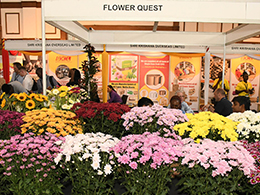
Floriculture is not merely about growing flowers; it encompasses the entire process from cultivation to marketing and distribution. The global floriculture industry has witnessed substantial growth, driven by increasing disposable incomes, urbanization, and changing consumer preferences towards sustainable and eco-friendly products.
The industry’s value chain involves multiple stakeholders including growers, wholesalers, retailers, and consumers, each playing a vital role in delivering fresh flowers to end-users across the globe. However, the complexity of the supply chain poses challenges such as seasonality, perishability, and logistical constraints, which consolidators aim to address through strategic interventions.
Consolidators in floriculture act as intermediaries who aggregate and distribute flowers sourced from multiple growers to various markets. They play a pivotal role in streamlining the supply chain, reducing inefficiencies, and ensuring a continuous flow of products to meet consumer demand. Key functions of consolidators include:
- Aggregation and Procurement: Consolidators source flowers from a network of growers, selecting blooms based on quality, variety, and market demand. By consolidating products from multiple suppliers, they achieve economies of scale and enhance efficiency in procurement.
- Logistics and Distribution: Efficient transportation is critical in floriculture due to the perishable nature of flowers. Consolidators manage logistics, including storage, packaging, and transportation, to maintain product freshness and quality throughout the supply chain.
- Market Access and Market Intelligence: They provide growers with access to diverse markets and distribution channels, leveraging their networks and market expertise. Consolidators also gather market intelligence, helping growers make informed decisions about crop planning and pricing.
- Quality Control and Compliance: Ensuring product quality and compliance with international standards is essential in floriculture. Consolidators implement quality control measures and certifications, facilitating access to export markets and meeting regulatory requirements.
The Emergence of Global Consolidators
The evolution of global trade and advancements in logistics have facilitated the rise of international consolidators in floriculture. These entities operate on a larger scale, spanning multiple countries and continents, to meet the growing demand for exotic and seasonal flowers year-round. Global consolidators leverage technology and data analytics to optimize supply chain operations, minimize wastage, and enhance product traceability.
Challenges and Opportunities
While consolidators play a critical role in enhancing efficiency and market access in floriculture, they face several challenges:
- Market Volatility: Fluctuations in demand and supply, influenced by factors such as seasonal variations and economic conditions, pose challenges for consolidators in forecasting and inventory management.
- Logistical Constraints: Transportation and storage of perishable products require specialized infrastructure and efficient logistics, particularly for international shipments.
- Quality Assurance: Maintaining consistent product quality across different geographies and complying with diverse regulatory standards can be complex and resource-intensive.
However, these challenges also present opportunities for consolidators to innovate and differentiate themselves in the market:
- Technological Integration: Adoption of digital platforms for real-time tracking, inventory management, and customer engagement can enhance operational efficiency and transparency.
- Sustainability Initiatives: Growing consumer awareness and demand for sustainably sourced flowers create opportunities for consolidators to promote eco-friendly practices and certifications.
- Strategic Partnerships: Collaborations with growers, retailers, and logistics providers can strengthen market presence and expand distribution networks.
The role of consolidators in floriculture is poised to evolve further with advancements in technology, changing consumer preferences, and global trade dynamics. Key trends shaping the future of the industry include:
- E-commerce and Direct-to-Consumer Models: Increasing adoption of online platforms for purchasing flowers directly from growers or consolidators, bypassing traditional retail channels.
- Vertical Integration: Consolidators may invest in vertical integration by acquiring or partnering with growers and logistics providers to control the supply chain from farm to market.
- Sustainable Practices: Emphasis on sustainable cultivation methods, organic certifications, and fair trade practices to meet consumer expectations for ethical sourcing.
- Market Diversification: Exploration of emerging markets and niche segments for unique floral varieties and customized floral arrangements.
In conclusion, consolidators are integral to the modern floriculture supply chain, bridging the gap between growers and consumers while optimizing efficiency and enhancing market access. As the industry continues to evolve, consolidators will play a crucial role in driving innovation, sustainability, and growth in global flower markets.
